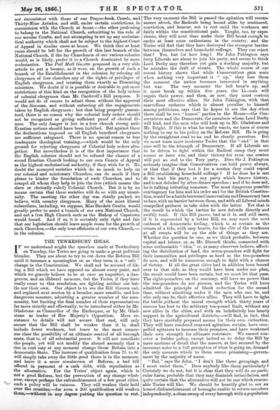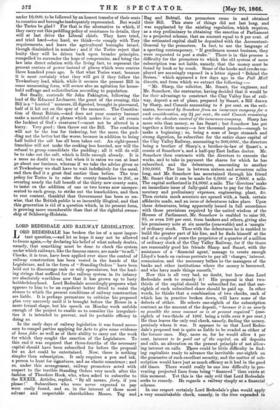THE TEWKESBURY IDEAS.
IF we understand aright the speeches made at Tewkesbury on Tuesday, the Tories are going to make a great political blunder. They are about to try to cut down the Reform. Bill until it becomes a meaningless or, as they term it, a " safe " change in the Constitution. We shall not be accused of lik- ing a Bill which we have opposed on almost every point, and which we gravely believe to be at once an imperfect, a dan- gerous, and an illiberal measure, but the Tories, if they have really come to this resolution, are fighting neither our bat- tle nor their own. Our object is to see the Bill thrown out, and replaced next session by a broader, more sensible, and less dangerous measure, admitting a greater number of the com- munity, but limiting the final number of their representatives far more strictly and effectually, to be introduced either by Mr. Gladstone as Chancellor of the Exchequer, or by Mr. Glad- stone as leader of Her Majesty's Opposition. Mere re- sistance to details will not secure that end, will only secure that the Bill shall be weaker than it is, shall include fewer workmen, but leave to the most numer- ous class the possibility of an ultimate control of all borough seats, that is, of all substantial power. It will not conciliate the people, yet will not modify the absurd anomaly that a rise in rent may at any moment change Great Britain into a democratic State. The increase of qualification from 71. to SI. will simply take away the little good there is in the measure, and leave it a mere simulacrum of Reform, a bad bill offered in payment of a cash debt, with repudiation as the alternative. For the Tories' object again, which is not a good Reform, but the prevention of any change what- ever, except perhaps the enfranchisement of a few great cities, such a policy will be ruinous. They will weaken their hold over the counties,—for even a 20/. qualification will weaken them,—without in any degree putting the question to rest. The very moment the Bill is passed the agitation will recom- mence afresh, the Radicals being bound alike by sentiment, conviction, and honour, not to rest until the workmen are fairly within the constitutional pale. Taught, too, by expo- rience, they will next time make their Bill broad enough to excite at least some enthusiasm in the country, and the Tories will find that they have destroyed the strongest barrier between themselves and household suffrage. They can reject that ? Yes, but for how long? Sir John Pakington says forty Liberals are about to join his party, and seems to think Lord Derby may therefore yet gain a working majority, but he mistakes the drift of events. The whole course of our recent history shows that while Conservatives gain seats when nothing very important is " up," they lose them the moment the nation becomes interested in anything but war. The very moment the lull brea(-8 up, and it must break up within five years, the a-erals will regain their power, and then, as now, they must content their most effective allies. Sir John Pakington, with that marvellous rashness which is almost peculiar to himself among politicians, says that he hopes to see the day when there shall be two "honest" parties in the House—the Con- servatives and the Democrats, the members whom Lord Derby will lead, and the men who will look up to Mr. Gladstone and Mr. Bright. If this is what he really wants, we have of course nothing to say to his policy on the Reform Bill. He is going by the straightest road to an end he clearly perceives. But we must warn more moderate Tories that the " end " in that case will be the triumph of Democracy. If all Liberals are to be driven to fight within the Radical camp they must sooner or later win, and their victory for even one session will put an end to the Tory party. Does Sir J. Pakington seriously imagine that Conservatives can hold power always, or that that if they lost it for a session they could repeal a Bill establishing household suffrage ? If he does he is not fit to lead his party, or any party which knows history, and is not deluded by after-dinner speeches ; and if he does not, he is talking irritating nonsense. The most dangerous possible contingency for him and his order and for the British Constitu- tion, would be a battle between Conservatism and Democracy face to face, with no barrier between them, and with all Liberal minds compelled perforce to take sides with the latter. Yet that is the result to which, the tactics he now defends directly and swiftly tend. If this Bill passes, bad as it is, and still more, if it is superseded by a better Bill, we may meet the next outburst of democratic feeling, which is as certain as the return of a tide, with easy hearts, for the e7ite of the workmen at all events will be on the side of things as they are. Whether the question be one, as we think probable, between capital and labour, or, as Mr. Disraeli thinks, connected with some enthusiastic "idea," or, as many observers believe, affect- ing the distribution of land, the seven-pounders will fight for their immunities and privileges as hard as the ten-pounders do now, and will be numerous enough to fight with a chance of victory. If all the great cities had in addition been bound over to that side, as they would have been under our plan, the result would have been certain, but we must let that pass. The eight-pounders, on the contrary, will have no power that the ten-pounders do not possess, and the Tories will have admitted the principle of blank reduction for the second time, without admitting under it the men who can be, and who only can be, their effective allies. They will have to fight the battle .yvithout the moral strength which thirty years of success has lent to the arbitrary ten-pound limit, without any new allies in the cities, and with an indefinitely less hearty support in the agricultural districts,—will find, in fact, that they have carefully prepared means for their own extinction. They will have rendered renewed agitation certain, have com- pelled agitators to increase their promises, and have weakened their own strength for ultimate resistance. We cannot con- ceive a feebler policy, except indeed so to delay the Bill by mere motions of detail that the masses, at last aroused by the incessant noise to a full perception of what is going on, demand the only measure which to them seems promising—govern- ment by the majority of noses. .
"But," says Sir John, "I don't like these groupings, and I must resist them." Does anybody like them particularly Certainly we do not, but it is clear that they will do no parti- cular harm, probable that they may diminish intimidation, and quite certain that the alternative will not be one which reason- able Tories will like. We should be heartily glad to see an honest disfranchisement of boroughs unable to return members independently, a clean sweep of every borough with a population
under 10,000, to be followed by an honest transfer of their seats to counties and boroughs inadequately represented. But would the Tories be glad For that is the alternative to which, if they carry out this peddling policy of resistance to details, they will at last drive the Liberal chiefs. They have tried, and tried hard—too hard, we think—to comply with Tory requirements, and leave the agricultural boroughs intact, though diminished in number ; and if the Tories reject• that lenity they will be driven back upon broader principles, compelled to surrender the hope of compromise, and bring the law into direct relation with the living fact, to represent the present centres of power instead of places which were centres three hundred years ago. Is that what Tories want, because it is most certainly what they will get if they follow the Tewkesbury lead, which, while it secures the present Bill in some unmeaning form, will secure also an agitation for house- hold suffrage and redistribution according to population.
But finally, contends Sir John Pakington, following the lead of Sir Edmund Lechmere, the guest of the evening, this Bill is a " hurried " measure, ill digested, brought in piecemeal, half of it hit out on the spur of the moment. The Constitu- tion of Great Britain,—and does not your country baronet make a mouthful of a phrase which makes him at all events the luckiest of God's creatures ?—must not be altered in a hurry. Very good ; then throw out the Bill. The confusion will not be the less for tinkering, but the more, the pud- ding not the better but the worse, because in addition to being half boiled the salt has all been taken out. An eight-pound franchise will not make the cooking less hurried, nor will the refusal to group consolidate the pudding ; all it will do will be to take out the salt, which is little enough already. It is a mess no doubt to eat, but when it is eaten we can at least go about our business, whereas if we take the advice given us at Tewkesbury we shall have to wait indefinitely for the meal, and then find it a great deal nastier than before. The true policy for Tories is to raise the county franchise to 20/., so securing nearly the full benefit of the thirty new county seats, to insist on the addition of one or two towns now unrepre- sented to each group, to strike out the leaseholders, and then to rest content, thankful that Government has been so un- wise, that the British public is so incurably illogical, and that this generation is rid of a question which, in its present form, is growing more unendurable than that of the rightful owner- ship of Schleswig-Holstein.































 Previous page
Previous page